Citing a boom in Apple Watch sales, market research firm Strategy Analytics in a report released Thursday said Apple overtook Fitbit to become the world's largest wearables vendor for the first quarter of 2017.
According to Strategy Analytics data, Apple sold an estimated 3.5 million Apple Watch units during the three-month period ending in March, up 59 percent from 2.2 million units sold during the same time last year. The performance was good enough to capture 16 percent of the global market.
Helping Apple secure the number one spot was Fitbit's massive year-over-year decline. In the first quarter of 2016, the firm shipped 4.5 million units, a figure that fell to 2.9 million units in March. The company is apparently feeling the effects of a trend toward full-fledged smartwatch devices like Apple Watch and products marketed by Samsung.
Fitbit previously commanded the wearables sector with relatively low-cost fitness bands and related accessories dedicated to tracking steps, counting calories and monitoring user heart rate. Higher end devices in the company's catalog incorporate GPS run tracking and larger displays for interfacing with a host smartphone. That could soon change, as images leaked earlier this week claimed to show a Fitbit smartwatch allegedly slated for release this fall.
"Fitbit shipped 2.9 million wearables worldwide in Q1 2017, falling a huge 36 percent annually from 4.5 million in Q1 2016," said Cliff Raskind, director at Strategy Analytics. "Fitbit has lost its wearables leadership to Apple, due to slowing demand for its fitnessbands (sic) and a late entry to the emerging smartwatch market. Fitbit's shipments, revenue, pricing and profit are all shrinking at the moment and the company has a major fight on its hands to recover this year."
Fitbit's sluggish quarter pushed Xiaomi into second place. With only two products in its quiver — the Mi Band and Mi Band 2 — Xiaomi managed to ship an estimated 3.4 million units to take 15.5 percent of the market for the first three months of 2016.
The Strategy Analytics report comes on the heels of Apple's earnings report for its second fiscal quarter of 2017. Discussing Apple's results in a conference call on Tuesday, CEO Tim Cook said Apple Watch sales nearly doubled from 2016. Together with AirPods and Beats headphones sales, Apple's wearables business is now the size of a Fortune 500 company, Cook said.
Update: Fitbit has issued a response to the report, saying it sold 3 million devices in the first quarter.
 Mikey Campbell
Mikey Campbell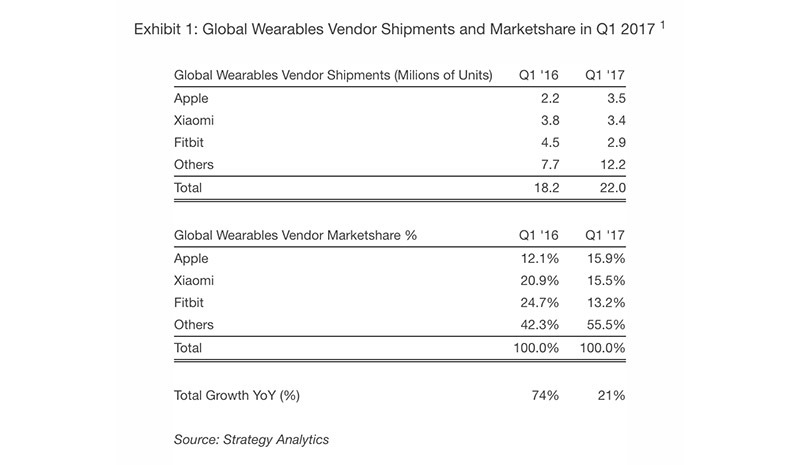




-m.jpg)


-m.jpg)





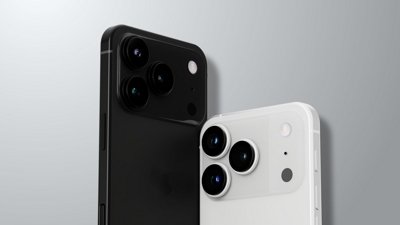
 Malcolm Owen
Malcolm Owen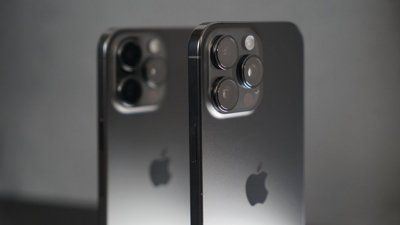
 William Gallagher
William Gallagher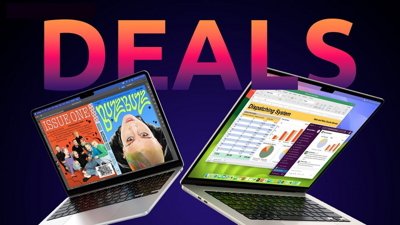
 Christine McKee
Christine McKee
 Chip Loder
Chip Loder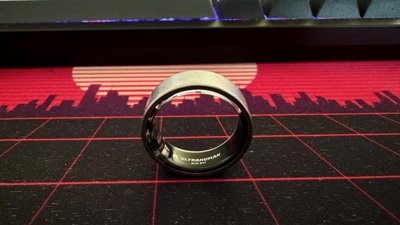
 Oliver Haslam
Oliver Haslam
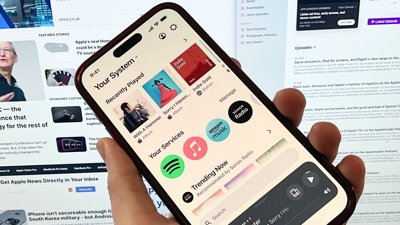

 Amber Neely
Amber Neely







31 Comments
I'm really enjoying my Apple Watch.
Simon Sinek in his TED talk on 'How Great Leaders Inspire Action', in which he uses Steve Jobs as an example, talks about 'the law of the diffusion of innovation'. He claims that to achieve mass-market penetration, a product needs to gain acceptance with more than the 2.5% of the market made up of innovators and the 13.5% made up of early adopters, in other words, approximately 16% of the market. If so, a couple of companies are at an interesting juncture. (Of course, Apple's wearable isn't strictly in the same market as Fitbit's).
The link: https://www.ted.com/talks/simon_sinek_how_great_leaders_inspire_action
If that's true it is more than incredible as the ASP for competing wrist-worn fitness devices is a fraction of the Apple Watch's ASP. To sell more of a more expensive product indicates a significant product success.
Unlike smart phones which are essential modern devices, one can easily get by without a fitness tracker/smart watch - logically people who do seek them out will be more discerning, and less likely to buy junky options (especially considering the wrist's location and association with projected wealth.) Those junky options were always drawer fillers, they never took on a trojan horse role for fitbit's more expensive offerings. It would not surprise me at all if cheap fitbit devices were the entry point for people that go on to purchase apple watches. (Anecdotally I have seen this transition several times, they start on a cheap fitness tracker, then if they "like it and use it" they switch to the more capable apple watch.)
As for fitbit's decline in sales, that was expected. Cheap brands were eating their low end 'gifting' (read: junk) product and those happy with their fitbit had little reason to purchase again - there have never been any legitimate upgrades to the fitbit line. This is entirely opposite to the apple watch which sees significant iterative improvements.
Fitbit's technology has always been far behind that of every major player in the market (motorola, lg, samsung, etc) they owe their entire legitimacy to the high volume of sales made on their less-than-$100 fitness tracker. The suggestion of an "early lead" was mistaken, as they were already at their technological apex.